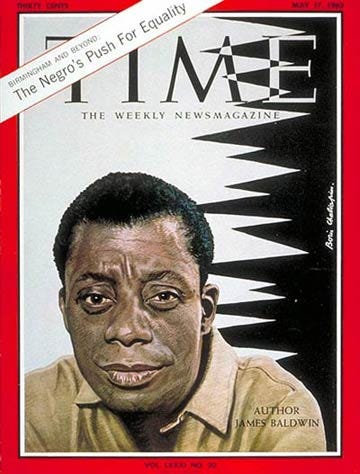He who has been so long rejected must now be embraced
Reading "The Fire Next Time" by James Baldwin and RCL Pr22A
It’s been a hectic week, and I found my mind still working out the implications of last week’s post. I wondered if maybe I should not try to write a new post. But I remembered that this is a camino. One walks as far as one can. If I need to “walk” a shorter distance this week, that’s okay.
I was able to read James Baldwin’s “The Fire Next Time.” It was published in 1963. Two convergences held my attention as I read: one was about history, the other was about the gospel reading in this week’s Revised Common Lectionary.
First, the history. In May of 1963, after the book was published, Time Magazine put Baldwin on the cover and ran an article entitled “The Root of the Negro Problem.” Four months later, on Sunday, September 15, white men bombed Birmingham’s 16th Street Baptist Church killing four young black girls.
Second, I kept hearing a passage from Matthew’s gospel.
The Fire Next Time consists of two essays. The first was a letter which Baldwin wrote to his nephew. He said:
You were born into a society which spelled out with brutal clarity, and in as many ways as possible, that you were a worthless human being… [T]he details and symbols of your life have been deliberately constructed to make you believe what white people say about you. Please try to remember that what they believe, as well as what they do and cause you to endure, does not testify to your inferiority but to their inhumanity and fear.
The Fire Next Time, Vintage International Books, 1993 Kindle edition at 7-8. Emphasis added.
In the second essay Baldwin argued that the success or failure of the American experiment depended upon its willingness or refusal to deal with its racist past and present.
[I]f we persist in thinking of ourselves as [a white nation], we condemn ourselves… to sterility and decay, whereas if we could accept ourselves as we are, we might bring new life to the Western achievements, and transform them. The price of this transformation is the unconditional freedom of the Negro; it is not too much to say that he, who has been so long rejected, must now be embraced, and at no matter what psychic or social risk. He is the key figure in this country, and the America future is precisely as bright or as dark as his.
The Fire Next Time, Vintage International Books, 1993 Kindle edition at 94.
And the gospel passage I kept hearing was this:
The stone that the builders rejected has become the cornerstone.
Matthew 21:42


